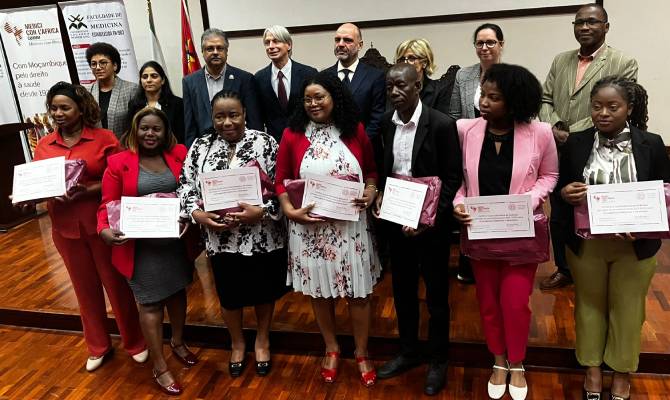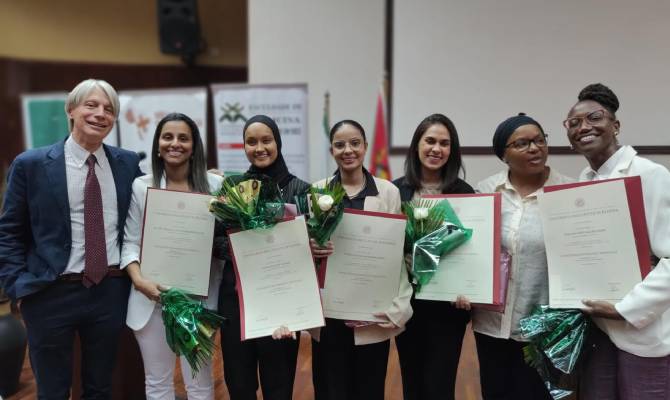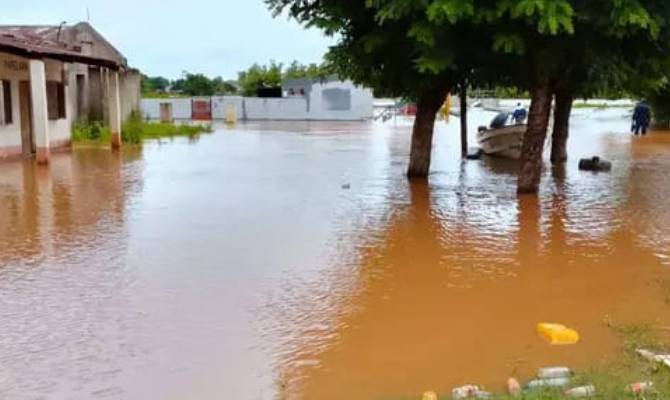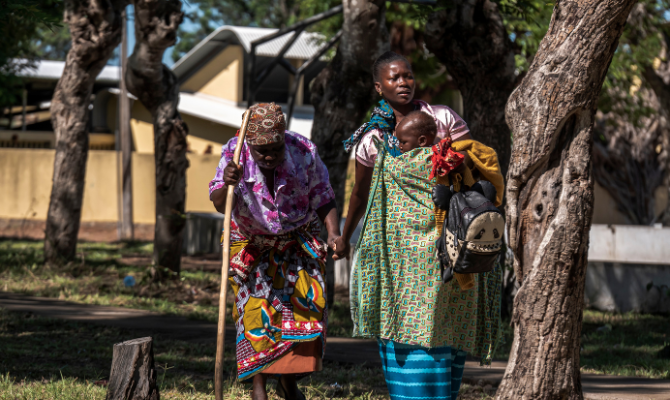The first edition of the advanced training program on pediatric and neonatal care dedicated to Mozambican professionals has just concluded and 14 professionals now hold the degree.
The initiative, supported by the Italian Ministry of University and Research (MUR) was led by University of Padua in collaboration with CUAMM and the two main Mozambican universities: Eduardo Mondlane University and the Catholic University of Beira.

Some of the nursing students graduated together with partners and institutions involved in the initiative
The goals of the program were to internationalize higher education in Mozambique, promote exchanges between academic institutions, and strengthen professional training in pediatric and neonatal care.
The advanced training program was launched in November 2022 at Eduardo Mondlane University in Maputo. Today, three years later, we gathered in the same location to celebrate the graduation of 14 students — 13 women and one man — from all provinces of the country. Among them: 6 doctors and 9 senior nurses. The event was attended by the Italian Ambassador to Mozambique, Gabriele Annis; Professor Jahit Sacarlal, Dean of the Faculty of Medicine at Eduardo Mondlane University; and a delegation from Padua including Prof. Liviana Da Dalt, former director of the Pediatric Emergency Department of the Department of Women’s and Children’s Health at the University of Padua; Prof. Daniele Trevisanuto, neonatologist at the University of Padua and coordinator of the program; and Giorgia Gelfi, CUAMM Country Manager.
“This master’s program is an opportunity for the doctors and nurses who took part, but above all for the health system, as they will be able to contribute to improving the health of the communities they serve, with particular attention to the most vulnerable, such as children,” said Ambassador Gabriele Annis, who concluded: “The Italian government, through the Ministry of University and Research, is committed to funding a second edition in order to continue strengthening the training of Mozambican healthcare professionals.”
The academic institutions involved collaborated in designing the joint program, drawing on the expertise of faculty members, researchers, and scholars from various disciplines. The training path included a set of general mandatory courses, followed by specific mandatory modules. Courses offered included: Ethics in Clinical Practice and Scientific Research; Communication and Expression Techniques; Fundamentals of Epidemiology; Basic Biostatistics; Advanced Research Methodology; Childhood Sociology; as well as Common Neonatal and Childhood Diseases in Mozambique; Pediatric Cardiopulmonary Diseases; Pediatric Hemato-oncological Diseases; Pediatric Neurological Diseases; Neonatal Emergencies; Pediatric Nephro-urological Diseases; and Pediatric Accidents and Poisonings.

Dr. Daniele Trevisanuto with five of the six doctors graduated and their tutor
“During the first year, we mainly focused on research and analysis and learned how to observe neonatal and pediatric care from a different perspective — one that is essential for improving the monitoring and treatment of the youngest patients. Then we delved into a more clinical part focusing on the most common diseases in Mozambique and through the studies we analyzed the main challenges and barriers to care. The visit to Italy, where we experienced a different system, made it clear to us that the most important thing is to develop effective strategies by seeking practical and achievable solutions within the local context. Only in this way can we truly make a difference” said Sara Razão Simão.
Thanks to the involvement of the University of Padua, four integrated courses were also offered:
PALS Course – Pediatric Advanced Life Support (coordinated by Dr. Andrea Pettenazzo);
Neonatal Resuscitation Course (coordinated by Prof. Daniele Trevisanuto);
Respiratory Diseases Course (coordinated by Dr. Serena Calgaro);
Pediatric Nutrition Course (coordinated by Dr. Giovanna Verlato).
To promote internationalization between universities, the training program also gave six doctors the opportunity to visit Italy and attend clinical activities at the University Hospital in Padua under the guidance of Dr. Daniele Trevisanuto, pediatric neonatologist and professor. A opportunity to explore a different care model and get to know better the Italian healthcare system.
The project, launched in Maputo in November 2022, involved Doctors with Africa CUAMM — which has long been committed to training doctors in Mozambique — and was led by the University of Padua, the initiative’s coordinator and a key actor in multiple areas: from planning the academic curriculum and training sessions, to proposing distance learning and e-learning formats; from identifying teaching staff to facilitating intercultural exchanges between faculties; from enabling access to learning for 14 students to sending materials and equipment essential for higher education.
For the six doctors who completed the advanced training course, this experience was “a unique opportunity that was no available in Mozambique,” as Yumna said, adding:
“Studying and working under the guidance of highly experienced professors allowed us to open our minds and envision new horizons of care that will help us approach our work as doctors with greater capability.”
A truly unique achievement that by combining clinical practice with academic research provided students with a methodology, an approach, and a vision that many of them consider the greatest competence gained.
“Beyond improving my clinical skills, this course has truly allowed me to adopt a broader perspective. I would say that, more than anything, now I feel capable of approaching pediatric emergencies with a new method—one that suggests me to focus on the preventive aspects necessary to define effective strategies to reduce child mortality,” said Joyce Ventura Monteiro.
“The diploma I hold today is not only a personal achievement but also a renewed commitment to the health of our children in Mozambique,” said Afsha Banu Tahibo. “The training I received has expanded my ability to intervene in critical contexts, strengthened my sense of responsibility, and provided me with concrete tools to improve neonatal and pediatric care in our country, where every intervention can make the difference between life and death.”





